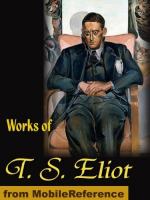|
This section contains 5,918 words (approx. 20 pages at 300 words per page) |

|
SOURCE: “Games of Consciousness,” in Auctor Ludens: Essays on Plays in Literature, edited by Gerald Guinness and Andrew Hurley, John Benjamins Publishing Company, 1986, pp. 157-69.
In the following essay, Spariosu examines the “modern crisis of consciousness” in “Prufrock.”
The arts without intellectual context are vanity.
—T. S. Eliot
In what follows I shall discuss the ways in which Eliot addresses the problematic of consciousness in “Prufrock,” a problematic which has preoccupied thinkers at least since St. Augustine, but which has resurfaced with renewed vigor in our age; in other words, I shall attempt to see Eliot's poem in the intellectual context of modernism, in terms of the so-called “modern crisis of consciousness.”
The poem has the form of a dramatic monologue or, rather, if I may coin the phrase, “interior dialogue,” in which the self of Prufrock appears as divided and disrupted or in a state of despair...
|
This section contains 5,918 words (approx. 20 pages at 300 words per page) |

|


